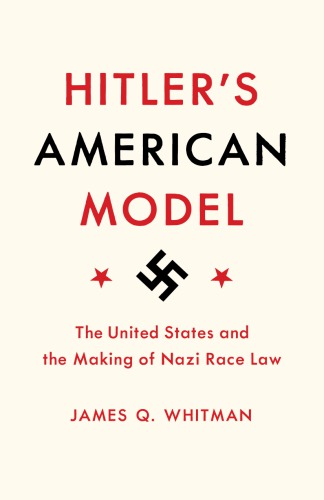
Hitler's American Model
The United States and the Making of Nazi Race Law
کتاب های مرتبط
- اطلاعات
- نقد و بررسی
- دیدگاه کاربران
نقد و بررسی

January 15, 2017
Mr. Hitler, meet Justice Holmes.Anyone pondering the results of the recent presidential election will detect the existence of at least two Americas. So did the Nazis. As Yale Law School professor Whitman (The Legacy of Roman Law in the German Romantic Era, 2016, etc.) observes, the Third Reich readily found plenty of precedents for their complex system of race-based law in American legal history, but they were also puzzled by "the strength of the liberal countercurrent in a country with so much openly and unapologetically sanctioned racism." By Whitman's account, the Nazis were sometimes even less heavy-handed on the legal front than the architects of Jim Crow--and, he writes, it must be remembered that racist laws spread far beyond the South. Nazi jurists even found some American laws too harsh, such as the "one-drop" rule of defining whether one were "Negro." As his argument builds, the author capably defends the assertion that the U.S. was not just a racist power throughout much of its history, but the pre-eminent racist power in the world, one that built elaborate classification schemes in the service of denying minorities and colonized persons full civil rights. Granted that the Germans were more thorough in their application: Whitman observes that whereas Germany sought to impose state machinery on race laws in order to avoid turning legal matters over to the mob, "the United States by contrast remained faithful to lynch justice." Whitman is careful to avoid the minefields of cause and effect: there has been only one real Hitler, after all, and only one Holocaust of the technocratic sort that he set in motion. Still, the author is clear that we should be alarmed and chastened by the fact that the Nazis found so much to emulate in American jurisprudence. "The image of America as seen through Nazi eyes in the early 1930s is not the image we cherish," he writes, "but it is hardly unrecognizable." A small book, but powerful all out of proportion to its size in exposing a shameful history.
COPYRIGHT(2017) Kirkus Reviews, ALL RIGHTS RESERVED.

























دیدگاه کاربران